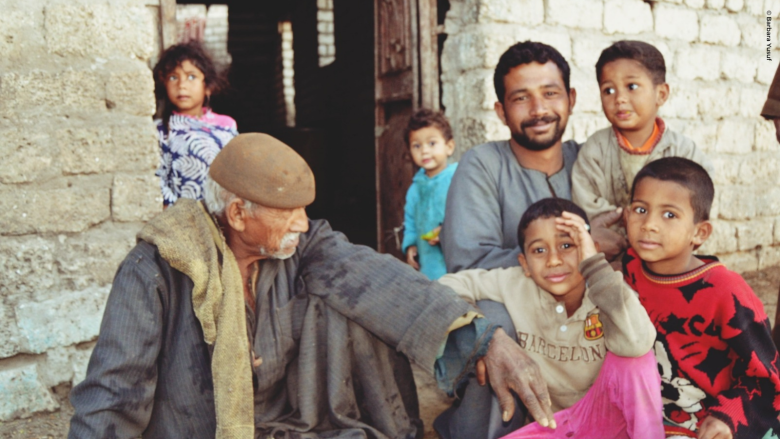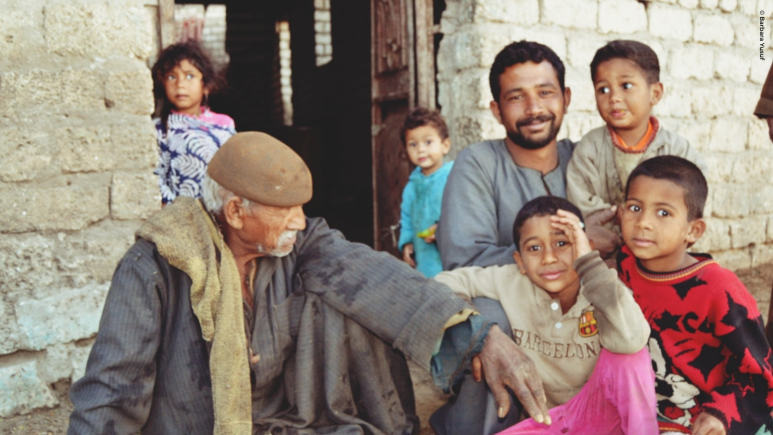By Barbara Youssef, investigative journalist
They’re known as the “Descendants of Strangers”, and years of social exclusion have forced them to live in isolated “ghettos” in Egypt, plunging them into poverty and sometimes crime.
The Al-Jams families, one of the tribes or families known as the “Descendants of Strangers”, live in Upper Egypt. More than 10,000 individuals from the Al-Jams families live in the village of Al-Fuqqai, about 20 kilometres west of Al-Minya Governorate.

Upper Egypt is a region characterized by its traditional agricultural landscape and a long history dating back to Pharaonic times. Despite its wealth in natural resources, the region faces significant challenges, including a lack of infrastructure and economic resources compared to the more developed northern areas and severe environmental issues, such as pollution caused by the excessive and unregulated use of agricultural pesticides, negatively affecting both the health of the population and the environment. Several communities face marginalization and social exclusion. Poverty, low educational levels, and a lack of cultural awareness are prevalent.
Khaled Ahmed is a young man who does not know his exact age — he could be 16 or 18. No one knows. Like other members of the Al-Jams family in Al-Fuqqai village, he does not have any identification documents. Khaled recalls with a sad smile, “I didn’t even get the polio vaccination, I didn’t go to school, I don’t receive food subsidies, and I won’t go to military service because I don’t exist. Even if I decide tomorrow to try and get my birth certificate, it’s impossible because neither my father nor my grandfather have identification either.”
Statistics obtained from the village mayor indicate that “90 per cent of Al-Jams families are not registered in official government records,” and most of their marriages are conducted by public declaration. This is because many marriages occur before the legal age. As a result, neither the parents nor their children have any official documents, depriving them of basic rights such as education, employment, and marriage, leading to their social marginalization in daily interactions. Over time, negative stereotypes about them have become entrenched, further isolating them due to hate speech that exacerbates their suffering.
Tamara Adham, an 11-year-old, has not had the chance to attend school. “If I had the choice, I would wish to go to school,” she says, but she understands that education remains a distant dream for the girls of Al-Jams.
Ahmed Nabil Shehata has two children, explaining that the boy may receive an education, but the girl has no chance. “We don’t educate our girls, and there isn’t a single educated woman in Al-Jams.” He adds that he is not ready to be the first to educate his daughter in the tribe and be subjected to attacks and harassment from all sides, further explaining that he has “come to the conclusion that girls learn life lessons at home”.
Meanwhile, Shahd, who was married at the age of 14, tells us about the bullying girls face from the village boys because of their hairstyles and clothing. She says the children chase after them and mock them with offensive remarks. She wonders, “What would happen if I went to school?”
According to Abdelghani Yousry, the local school principal, the village of Al-Fuqqai has about 3,000 children of Al-Jams who are of elementary school age (under 15 years old). Yet, none of them are registered at the school. He attributes this to several reasons: the children do not have birth certificates, and civil society organizations must play a stronger role in raising family awareness and explaining the importance of education for the new generation.
Khaled and Tamara represent the typical boys and girls in Al-Jams families who are deprived of education. At an early age, Khaled begins tending to buffaloes, a trade mastered by the men of Al-Jams. At the same time, Tamara goes begging, roaming daily with other girls from the tribe across the villages and governorates of Upper Egypt.
Amer, the elder of the Al-Jams family, says: “We are used to this primitive lifestyle, and as we were raised, so we raise our children—on raising buffalo and tending to animals. Every young man has a buffalo or more on a small piece of rented land, and the animals live in the same houses we live in, which sometimes adds an unpleasant smell to the place.”
Shaher Mohamed, the village mayor, says that most of the Jams family’s problems and conflicts occur internally, with violence being widespread among them, sometimes escalating to murder, as happened a few months ago during a fight that led to one of them being killed with a naboot (a stick used in herding), resulting in the death sentence for two individuals.
Doaa Mohamed, a coordinator at the Saint Mark Foundation for Development, works on short-term projects concerning women, children, and intermittent labour. She says: “Civil society organizations or development institutions avoid collaborating with Al-Jams due to the chaos and the fact that they form a community within a community ruled by disorder. A small problem could lead to incitement against them and the spread of hate speech, exacerbating the situation in the village. Sometimes, the villagers fear Al-Jams taking control, so they remain wary of them.”
She adds: “A minor incident recently involving a girl from Al-Jams led to significant tension in the village, with locals calling for their expulsion and barring them from using public transportation. As a result, Al-Jams had to walk three kilometres to reach transport in the neighbouring village, and this situation persisted for months.” She notes that “Al-Jams are generally subjected to hate speech due to their perceived status as strangers and their lack of social acceptance in small rural communities”.
In this situation, there are potential solutions. Novelist Khaled Ismail, who hails from Luxor, where a large number of Al-Jams reside, explains how some of the educated members of marginalized groups like Al-Jams found ways to escape oppression by fleeing to large cities. There, individuals can live freely without being asked about their tribe or family background. This allowed them to escape the oppression they faced. However, the poor from these groups remained in the villages, continuing to endure injustice and oppression.
Another solution – a spiritual one – is through Sufi and Saadiya orders attributed to Sheikh Saad Al-Din Al-Jabawi. These ٍorders include the poor from the countryside in Upper Egypt. In these orders, the individual is called ‘a servant of God,’ they practice rituals and ceremonies that bring everyone together in a sacred place. In this way, the social gap between the oppressed and those with dominance and influence disappears, ensuring peaceful coexistence. However, this has led to mockery, as writer Ahmed Ismail, a native of Sohag, explains. “The affiliation of the Al-Jams to Sufism has been seen by some as an escape that isn’t taken seriously.”
Sheikh Mohamed Ibrahim Al-Sayed, Director of Al-Hikma Consultation Center, says while everyone has the right to be proud of their origins, this should not lead to arrogance or viewing others as inferior, as this attitude is not in line with religious teachings.
School principal Yousry shares the idea of coexistence and establishing single-class schools within the village for the children of Al-Jams who have reached the legal age for school enrollment. The village mayor suggests that concerning legal documentation, there should be cooperation between institutions and the Ministry of the Interior to encourage Al-Jams families to register their children and obtain identification documents and to penalize those involved in early marriages, whether they are members of the families or religious figures.
The Al-Jams family remains a living example of the challenges faced by marginalized groups in Egypt. It is a reminder that much more needs to be done to ensure their basic rights and to give them fair opportunities in life. The situation of these families requires urgent and comprehensive intervention to improve their social and economic conditions through education, economic development, infrastructure improvement, and community awareness. This can help them break free from the cycle of poverty and crime, integrating them into society as active, contributing members to sustainable development.
This report was produced with support from the Media Diversity Institute and the International Center for Journalists (ICFJ).
Pictures by Barbara Youssef, investigative journalist.
Disclaimer:
The views and opinions expressed in this article are solely those of the author and do not reflect the official policy or position of the Media Diversity Institute. Any question or comment should be addressed to [email protected]

